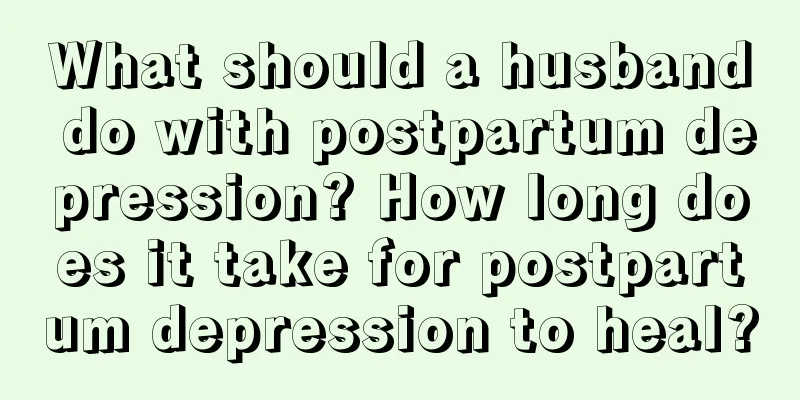What should a husband do with postpartum depression? How long does it take for postpartum depression to heal?

|
After giving birth, women need time to adapt to this sudden change. The huge gap in life and the attitude of people around them can easily lead to postpartum depression in postpartum mothers. So what should husbands do if they have postpartum depression? How long will it take for postpartum depression to heal? What is “hypocritical” postpartum depression?When it comes to "postpartum depression", many people will say that mothers are really "hypocritical". Are they really hypocritical? Are they really fragile? I believe that anyone who has been a mother will definitely disagree with this statement. According to statistics, the incidence of postpartum depression in my country is as high as 5.45% to 37.14%, and there are even frequent cases of new mothers harming themselves and their children, but it is often ignored by the mothers, families and even society. In people's minds, a mother after giving birth should be immersed in the joy of a new life, taking care of the baby in an orderly manner, and the whole family should enjoy the warmth and happiness brought by the little member... However, the situation of a new mother after giving birth is - "The most frustrating thing is that I have to deal with my baby's reversed day and night schedule. I have to get up every two hours to feed and change diapers, while my husband always sleeps like a pig..." "I am always wondering whether the baby is hungry, uncomfortable, cold or hot, why is he crying, why is he crying even though he is full." "After giving birth, I became a gold medal nanny. I washed diapers, sheets, clothes, cooked, fed, cleaned... Even if I had three heads and six arms, I couldn't finish all the work." "It's time to start talking about my mother-in-law's parenting tips. You can't wear too little on your baby, you can't let your baby eat this or that. Is what the book says more reliable than what I do myself?" "It feels like all my friends in my circle of friends are doing well, but I can't do anything except breastfeeding, wuwuwu" "I am also full of hostility towards my family. A casual word can shatter my heart!" “I feel like my husband doesn’t care about me at all” “Why am I always alone???” … These are the symptoms of postpartum depression we have been talking about! To sum up, the most depressing and frustrating symptoms after childbirth are: body pain, fatigue, severe lack of sleep; lack of care and companionship from the other half; the inability to express the grievances caused by the change of identity; the shrinking circle of friends, loss of freedom and self, etc. Physiologically speaking, postpartum depression is caused by the sharp decrease of estrogen, progesterone and other pregnancy-related hormones in the mother's body after childbirth. So, postpartum depression is not just pretentious. To a certain extent, it is a "disease" that has a serious impact on the physical and mental health of both mother and baby. If the condition is serious or not treated in time, it can also develop into postpartum psychosis. To fight postpartum depression, husbands should do this1. Talk with others More communication and exchange are the most effective ways to prevent and relieve postpartum depression. The person closest to the new mother is the husband, so every time you come home from get off work, don’t be indifferent to your wife and just play games, or only pay attention to the baby and ignore your wife. You must spend more time talking to your wife. How are you feeling today? Is there anything you want to eat? How are you feeling? Learn more about your wife's current situation, and offer more counseling and help. 2. Have fun with others The main purpose is to divert the new mother's attention and stop focusing on the baby or annoying things. Don't treat new mothers in the traditional way, such as not being able to go out, work, or even watch TV. These will make new mothers feel that life is more boring and monotonous, and aggravate their depression. Dad can take time to watch variety shows, do simple housework, and do appropriate exercises with mom, so as to spend more time with his wife and let her know your care and love. 3. Eat with her Pay more attention to your wife's diet. During the confinement period, people usually eat a lot of supplements, but they don't know that these foods can easily make people irritable, insomnia and anxiety. It is recommended to pair some light food for your wife, eat more fresh vegetables and fruits, drink more warm water, and give your wife the most caring care. Do a good job of mediation in the relationship between mother-in-law and daughter-in-law Since ancient times, the relationship between mother-in-law and daughter-in-law has been a major problem. In fact, the most important role in it is the husband. Especially after the wife gives birth, it is easy for the mother-in-law and daughter-in-law to have conflicts over confinement, breastfeeding, and childcare. Because the mother-in-law is bound by old traditional customs, such as not allowing you to take a bath or wash your hair during confinement, not allowing you to turn on the air conditioner on hot days, and wrapping the child like a zongzi in winter... These habits can easily cause conflicts of opinion with modern young people. For men, this is a very challenging topic. If it is handled well, the mother-in-law and the daughter-in-law will each "love the whole house and the whole dog" - the mother-in-law loves the daughter-in-law because she loves her son, and the daughter-in-law loves the mother-in-law because she loves her husband, and each gets what they want, and the relationship will be harmonious. However, if it is not handled well, a rift will appear between the mother-in-law and the daughter-in-law, which is difficult to repair. The love from the husband is the best medicine to cure his wife's postpartum depression. Let the new mother feel your love and the warmth from the family, and postpartum depression will naturally heal without treatment. How long does it take for postpartum depression to heal?It depends on the individual situation and the degree of postpartum depression. If it is mild, it will generally get better after the confinement period. If it is more serious and you are still depressed after the confinement period, it will take a long time to recover. The incidence of postpartum depression is 15%-30%. Postpartum depression usually develops within 6 weeks and can recover on its own in 3-6 months, but severe cases can last for 1-2 years. The most prominent symptom is persistent low mood, manifested as gloomy expression, listlessness, drowsiness, easy tears and crying. Postpartum depression is the biggest worry for postpartum mothers. In mild cases, it affects the mother's entire state, and in severe cases, it endangers her life. So, how can postpartum mothers get out of the shadow of childbirth? The father's approach is crucial~ |
<<: What is the reason for the baby's bad breath? Mothers should pay attention
>>: What to do if your baby is allergic to milk protein? Parents’ feeding is crucial
Recommend
What should I do if my child has trichoderma? What should I eat if I have trichoderma?
Spring is the peak season for epidemic leukemia. ...
The pros and cons of children being exposed to dialects How do families with promiscuous languages teach their babies to speak
When children start to speak, parents will have a...
How much weight can the waist stool be used for the baby? Can the waist stool be washed in a washing machine?
Most mothers will use a waist stool when they tak...
How can expectant mothers celebrate their pregnancy?
Pregnancy actually has many benefits for women, s...
Which is better, Kao Pampers or Unicharm diapers? - Usage comparison
Kao, Pampers, and Unicharm are all maternal and i...
How is the quality of Vinda tissue paper? Can Vinda tissue paper be thrown down the toilet?
Vinda tissue is a common tissue brand in our dail...
How long should you drink brown sugar water after giving birth? How much brown sugar water should a pregnant woman drink a day?
Drinking brown sugar water after childbirth is a ...
Can I change the brand of baby milk powder? Can I mix baby milk powder?
I am afraid that my baby will get sick of the sam...
My wife got pregnant after having sex during her menstrual period. Can I get pregnant after having sex during my menstrual period?
Wife got pregnant after having sex during menstru...
How to distinguish the authenticity of Tianxi Pills? How to distinguish the authenticity of Tianxi Pills?
Tianxi Pills are a kind of medicine that can help...
How much does a Flair food processor cost and how to use it
Food processors have many benefits. They can blen...
What causes itchy stretch marks? What should I do if they cause itchy stretch marks?
What causes itchy stretch marks? Itchy stretch ma...
How to regulate baby's constipation diet is the key
Do your children have long-term constipation prob...
What to prepare for self-driving tour with baby? Things to note when self-driving tour with baby
Things to note when traveling by car with a baby....
Newborns should hold newborns and pay attention to the following points
For many new parents, taking care of a baby shoul...









